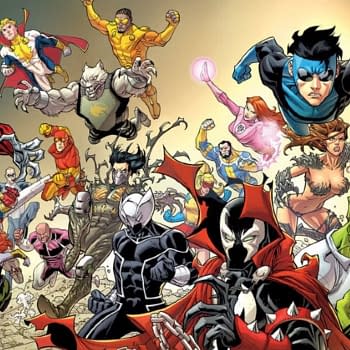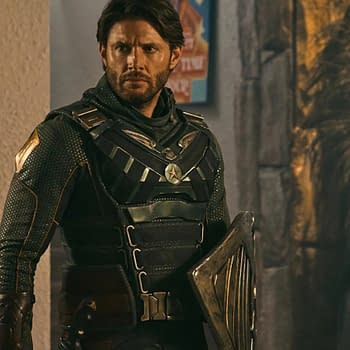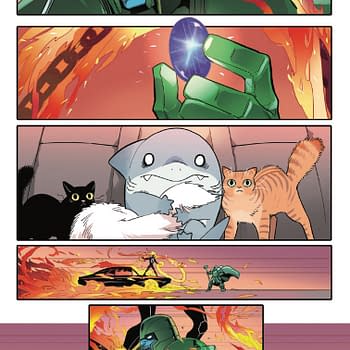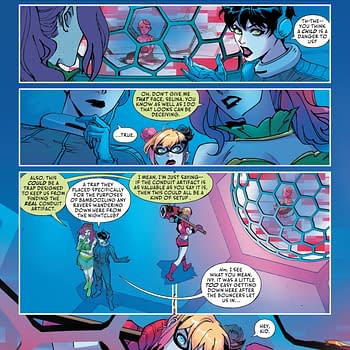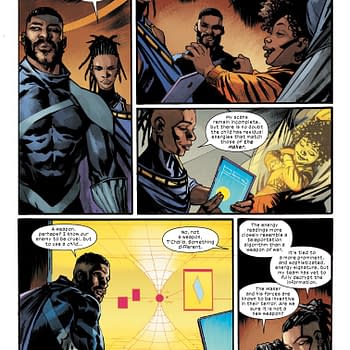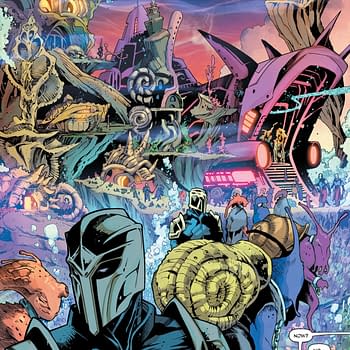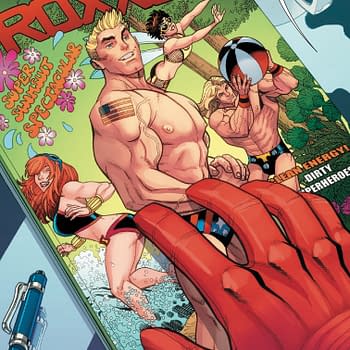Posted in: Comics | Tagged: Comics, image, Justin Jordan, luther strode, superboy
A Second Look At Luther Strode Vol 1 or Why Justin Jordan Is So Bloody Hot Right Now
Justin Jordan is a remarkably direct person who seems to shuffle off any traces of affectation, particularly when he gets up in front of people at panels. He's often more interested in talking about the projects of his colleagues in comics, and asking them questions, often with obvious enthusiasm, then commenting at length on his own. And I daresay, we like that about him. He comes from, and still lives in Pennsylvania. He started out in fandom tirelessly churning out con coverage himself in the old days, and that kind of never miss a beat commitment to comics seems to carry him now on a pretty hefty upward spiral toward being a major player in comics writing. But there seems to be a trend right now, an exciting one, for creators to diversify and keep those various doors open to a wide range of publishing platforms. It means that you can read the same writer in genre comics and in hero comics, in one-shots and long arc stories. You see their work from more angles, and that brings out the nuances in their writing or artistic voice. That really builds an audience for a creator, and Justin Jordan is an excellent example of that phenomenon.
Rumors were flying at San Diego Comic Con that Jordan had, or was intending to walk off working on Superboy, but would continue on other DC titles like Green Lantern: New Guardians, and then another rumor popped up that he'd be joining the team on Avatar Press's Crossed, which really excited long-time fans of the series. These reports have now been confirmed and it's another illustration of how mobile Jordan is, and suggests that he knows what he wants to work on, and what suits him best, and has a degree of agency in making sure that happens. That's because he's hot right now, but in all fairness, that's not likely to be a passing thing, and other creators are likely to follow the same example of pursuing their particular interests in a wide range of comics rather than hitching their horse to one wagon. More power to them.
Luther Strode, written by Jordan and drawn by the superbly talented Tradd Moore, was an honest to goodness co-creation, launched by Image to increasing success, though at Heroes Con this summer Jordan expressed surprise at the fan-base and still considered it something of a small personal project alongside his more mainstream work. Luther Strode won't go on forever, he warned, and will end when it needs to end, so enjoy it while you can. Taking another look at the collected Volume 1's origin story, The Legend of Luther Strode is an enlightening way of tracking just why Jordan is so hot right now. It's like having a more private conversation with the writer about what he picks to work on when he's most fully in the driver's seat. What you find is that Jordan has a strong grasp of the tradition behind hero stories, and that despite knowing all he needs to know about hero stories, he drops that all in a dumpster and walks merrily away. I'll explain more fully what I mean by that in a moment.
So, Jordan knows hero stories. Yes, he does. That's clear in Luther Strode. And this is more or less supported by his avid comics fandom before writing comics. He knows that most hero stories are wrapped up in issues of self-image, disempowerment, longing, and transformation. He knows that there's a lot of subtext in hero stories about violence and the roots of violence and whether violence is a vicious circle that heroes get drawn into. He knows that a hero has to deal with fear for those close to him the closer he gets to violence, that it's one of the biggest tensions in a hero story. He knows that sidekicks are vulnerable and love interests are going to have to be surprising to endure the same tensions that drive him away from other people. He knows that a hero's worst enemy is himself, or his father, or that those are the same thing. All of these things, of course, I'm directly lifting from The Strange Talent of Luther Strode. You don't have to work hard to find these elements, in fact, I've listed them more or less in chronological order as they appear in the collection.
Luther dislikes his self-image, sees himself as puny and disempowered, wants to change that and so, despite misgivings starts using "The Hercules Method" to change himself. It's ordinary and extraordinary because the book turns out to be somewhat magical, of course. He has a reason to feel disempowered, an abusive father that he and his mother are in hiding from, and a lifetime of watching her suffer without the ability to protect her. But he also wants to attract a hot girl's attention. He wants to transform himself and change his life into an active rather than reactive pattern. He doesn't want to hide and get by any more; he wants to step forward into a proactive role. Arguably, Luther Strode is mostly about violence, and as Luther discovers his exponentially increasing power, he steps back and considers violence. Violence, in many ways, makes him sick because of his overexposure to it growing up.
He considers and stops himself from causing massacres, which is a pretty remarkable thing. But his tempter in the Librarian would drive him into a kind of all-powerful role as a ruler through violence. The mythology behind "The Hercules Method", by the way, is one of the most surprising and, let's face it, cool things about the book, too. Suddenly we get caught up in a centuries-long explanation of how violence has always ruled the world and how Luther has a part to play in this legacy. That's a good hero story, and it's good storytelling to boot. Luther has to strive to protect people: his friend and chief supporter Pete, his mother, the tough as nails and also violence-immersed Petra. It's all heroic in construction, from the underlying structures to the details. Does that necessarily make people want to read it? It means that people who are interested in hero stories anyway want to read it, and those who want a hero story that's not immersed in decades of continuity can jump on board.
But now for my primary accusation, that Justin Jordan is hot right now not only because he knows hero stories, but because he chucks it all in the dumpster and walks away. Think of the vast weight of pulp paper of every issue of every superhero comic that's ever been printed. If you could get even just one copy of each one in the same place, the number would be vast and the amount of paper almost obscene. If you collect even a few comics, you know the kind of real estate they take up. But then consider the ideas in those superhero comics, the similarities and differences, and what it means to be pretty well versed in the vast majority of what they contain. Justin Jordan is pretty well versed. That kind of real estate seems to be inhabiting his mind, based on the construction of Luther Strode. When people know this much about hero stories and manage to succeed in writing good hero stories of their own, they usually do so by one of two methods. Firstly, they might carefully thread together a series of references and interrelationships that ties their work into the tradition of hero stories in comics to a finely honed degree, and the result is both clever, familiar, and dazzling. Or, alternately, they do something that is in some ways even more surprising. They chuck it all in the dumpster and walk away and write their story. A story that is purely their own despite the immense tradition they are part of.
To do that seems to be a kind of exercise in operating in two frames of mind at once for Jordan. He pulls in all the tropes and patterns from the hero stories he's familiar with, but he acts as if they've never been written before. The effect is that you've never read one before. That is a phenomenal accomplishment given the pretty extreme degree of knowledge that most fans have if they follow hero stories. How can he trick you into believing you've never heard about a kid with self-esteem issues battling violence in his life and finding he could be massively destructive himself if he's not careful? The explanation seems simple. You drop all reference to other stories (in The Strange Talent of Luther Strode there are a few superhero references but they are mild), you place your characters in a very basic set of circumstances, and you watch what they do and what decisions they make. You keep it as stripped down as if you just took the pieces of a hero story out of the box and screwed them together for the first time.
It takes a lot of guts to do this, and an attitude that just because everyone else has done something doesn't mean that you can't do it too and do it in your own way. Presumably, you do this because you feel that the basic construction of a hero story is still relevant to readers. Jordan establishes that relevance through using classic high school settings, bullies, parental relationships, friendships, and romance which anyone could identify with. He includes the details and the texture of a life one could believe is real. He starts over with Luther Strode, and there's something so basic about using "The Hercules Method" book, too, that takes us right back to the beginning of superhero stories, as if signalling the baggage he's prepared to drop to craft a surprising, fresh, agile story we want to keep up with.
So, if this is part and parcel of why Luther Strode has been so successful, it probably has application to Jordan's other works too. Operating in more established super hero universes, he's going to have even more baggage to sort through. Is he going to take the dumpster approach? Can he convince us we haven't read these things before? If he can, he'll not only stay hot, he'll reinvent the genre in pretty shocking terms like it never existed in the first place, and that would be very hot.
Hannah Means-Shannon writes and blogs about comics for TRIP CITY and Sequart.org and is currently working on books about Neil Gaiman and Alan Moore for Sequart. She is @hannahmenzies on Twitter and hannahmenziesblog on WordPress. Find her bio here.












